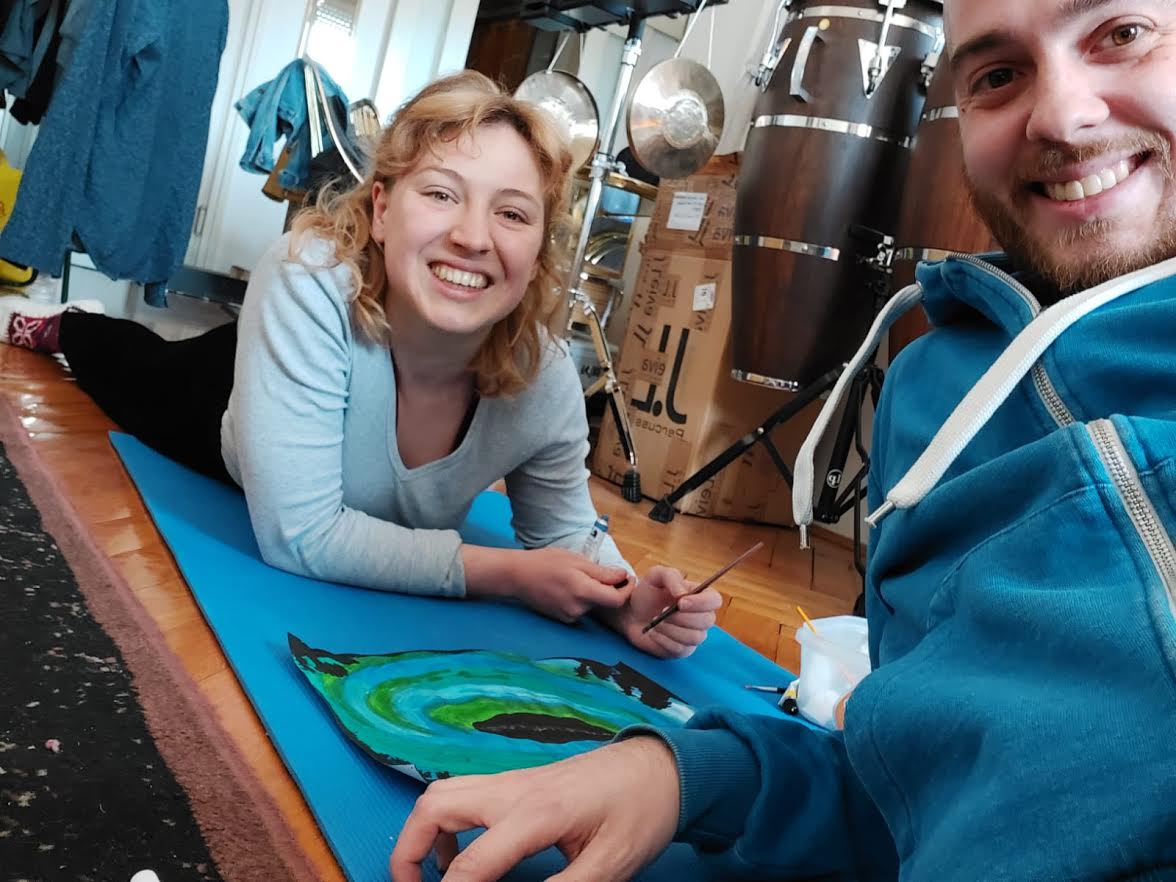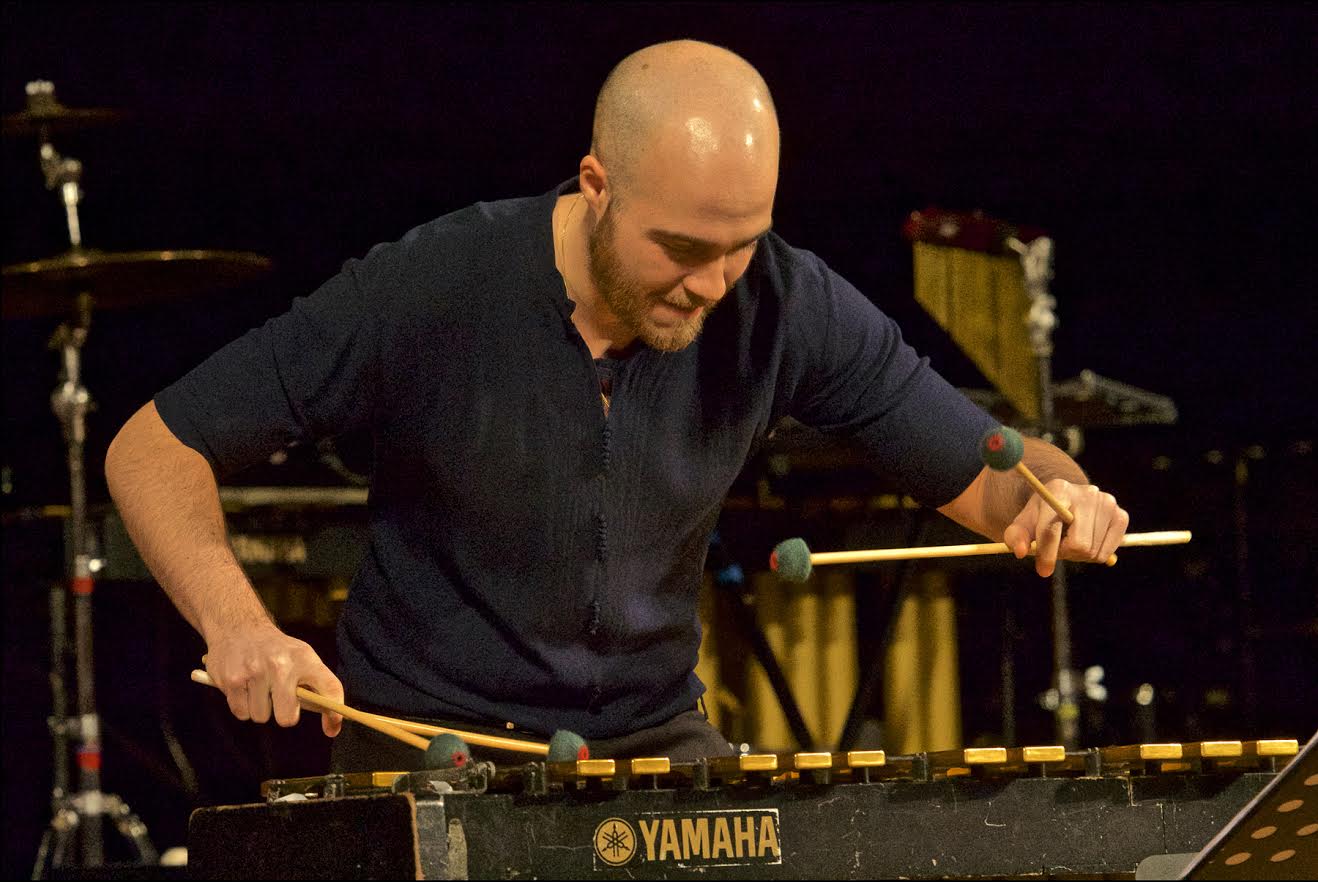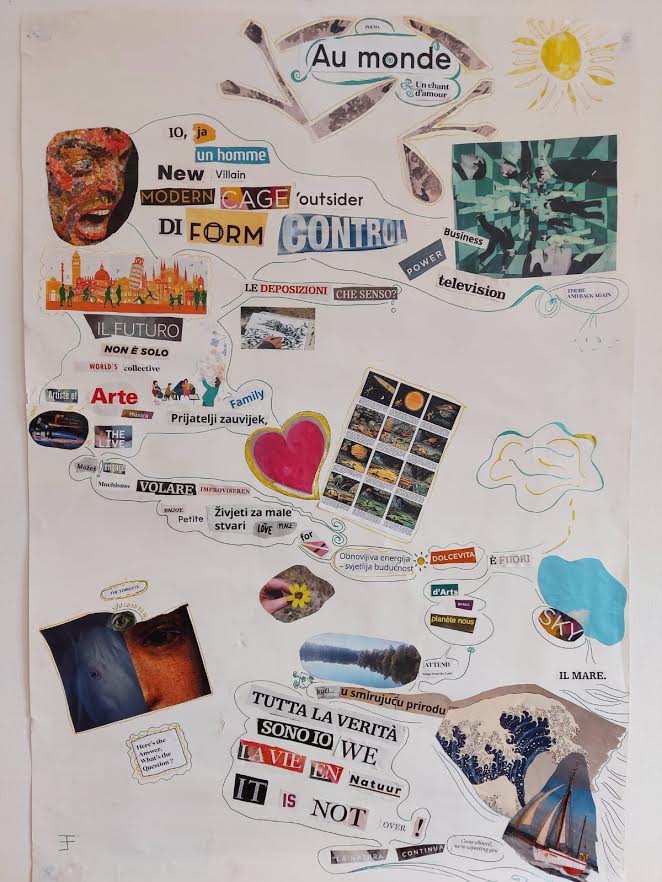Kad su za vas bile "zlatne godine" u Hrvatskoj? Ankica Mamić iz Zagreba
15. travnja 2020. - Dakle, kad je za vas bila zlatna era života u Hrvatskoj? Nova serija članaka osvrće se na sretnija vremena kroz oči stanovnika Hrvatske. Prva u seriji je dugogodišnja ljubiteljica TCN-a i vrhunska kuharica, Ankica Mamić iz Zagreba.
Dobio sam mnoge molbe da na ovu stranicu dodat drukčiji sadržaj - po mogućnosti veseliji - da bih malo unio živosti u cijelu ovu mizeriju vezanu za koronu. Razumijem te očajničke želje. Ako mislite da su vijesti o koroni toliko naporne, podijelite neku lijepu misao s nama kojima je posao o tome izvještavati cijeli dan.
Pa eto ideje, na kojoj sam veoma zahvalan mojoj prijateljici Ankici Mamić, koja ju je tako izvanredno pokrenula - Kada su za vas bile "zlatne godine" u Hrvatskoj?
Prije par tjedana pokrenuli smo seriju Foreign Self-Isolation Stories: Do You Feel Safer? (Strane priče iz samo-izolacije: osjećate li se sigurnije?), u kojima smo pitali strane državljane koji žive u Hrvatskoj da usporede kako se Hrvatska nosi s ovom situacijom, u usporedbi s njihovim originalnim domovinama. Do sada smo dobili gotovo 40 sjajnih odgovora na intervju, od Hong Konga do Hondurasa, Kine do Meksika, Japana do Novog Zelanda.
Novi logičan iskorak bio je Glasovi Korone u dijaspori, u kojima smo nastojali saznati kako se Hrvati u inozemstvu nose s okolnostima u kojima su se našli, u usporedbi s Domovinom.
A onda, da bismo pokušali dodati nešto veselja, započeli smo "Stranci u izolaciji: Mojih 10 najboljih iskustava u Hrvatskoj". Te članke možete pronaći, kao i upute za prijave na bilo koju od tih kategorija, ispod intervjua u pojedinačnim člancima ovdje.
Ali, istovremeno sam htio pronaći način da se ljudi u Hrvatskoj sjete sretnijih vremena, pa smo razmišljali uvesti seriju članaka o sjećanjima ljudi o njihovoj najdražoj eri života u Hrvatskoj. Ako želite sudjelovati, molim vas da pošaljete svoj tekst, 4-6 fotografija, uvodni pasus te (ako to želite) link na vašu web-stranicu na This email address is being protected from spambots. You need JavaScript enabled to view it., sa subjectom Zlatna era.
A sad, pročitajmo što o zlatnim godinama ima reći Ankica Mamić.
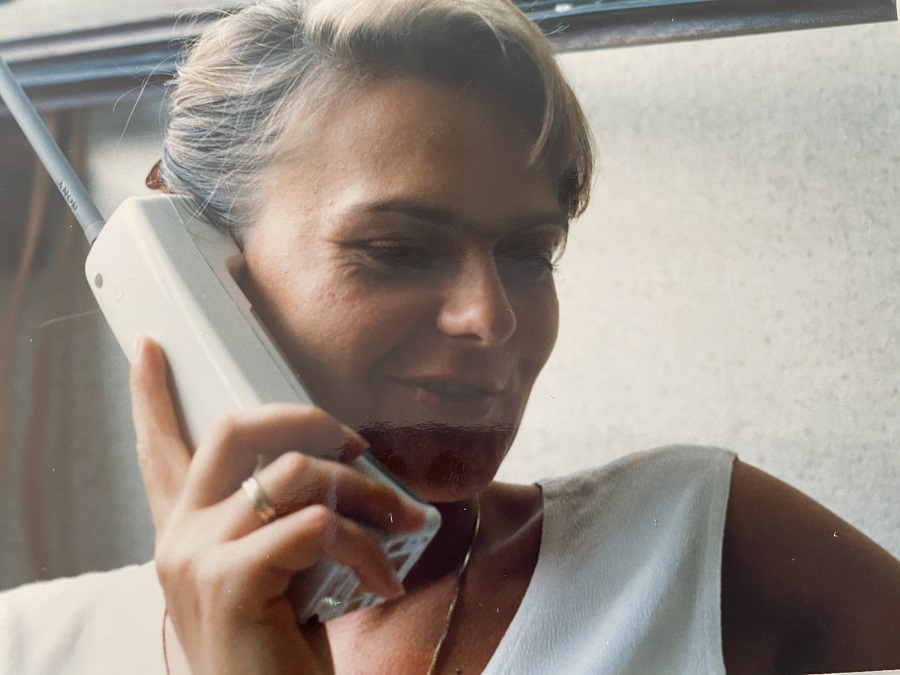
Hrvatska je prekrasna zemlja i kad bi govorili samo o oku vidljivim ljepotama i prednostima života u njoj, lista bi bila jako duga. Međutim, nije lijepo uvijek samo ono „izvana“. Najljepše uspomene nastaju onda kada se ostvaruju ciljevi – životni i poslovni, vlastiti i opći.
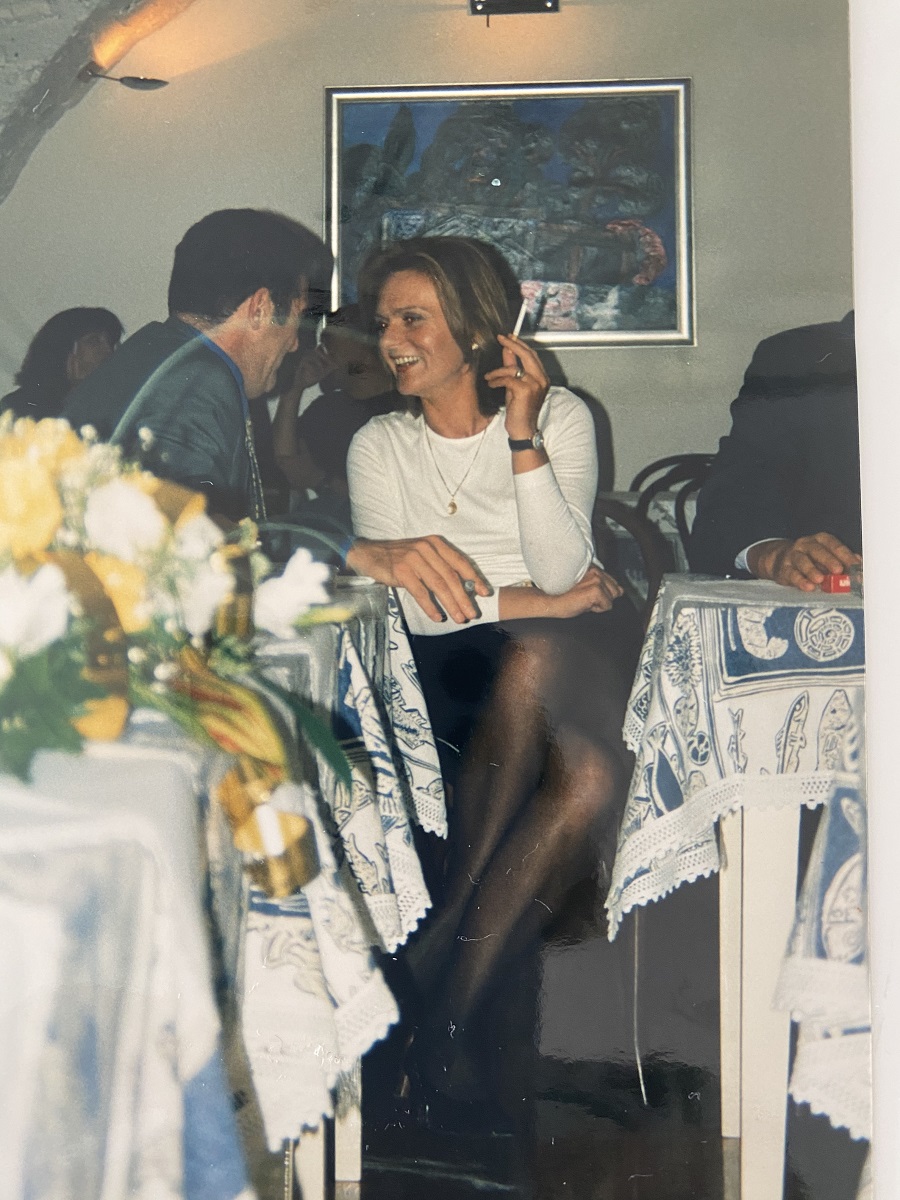
Stoga bih se najprije vratila u vrijeme kasnih 80-tih, kada se nazirao pad komunizma i kada je počela izranjati stoljetna čežnja za vlastitom državom. Tada sam bila u godinam kada sam mogla s dovoljno zrelosti, a opet i dovoljno mladosti za zanos i strast, sve to proživljavati i razumijevati. „Gutala“ sam vijesti, pratila sve što se priča i događa, s nestrpljenjem iščekivala svaku novost. Nažalost, shvatili smo vrlo brzo da će ostvarenje sna biti teško i bolno. Počeo je rat i naši životi su se preko noći promijenili. Međutim, to teško vrijeme donijelo je i mnogo lijepih stvari. Zajedništva, promišljanja i traženja rješenja. U podrumima zagrebačkih restorana okupljale su se skupine ljudi koje su na različite načine željele dati svoj doprinos i sa zadovoljstvom sam se i sama pridružila. Bila sam blizu mnogim ljudima koji su ubrzo postali jako važni i koji su ostavili trag u mom životu. Ponajprije, od tih sam ljudi ljudi mogla puno naučiti jer su me inspirirali da tražim najbolje dijelove sebe.
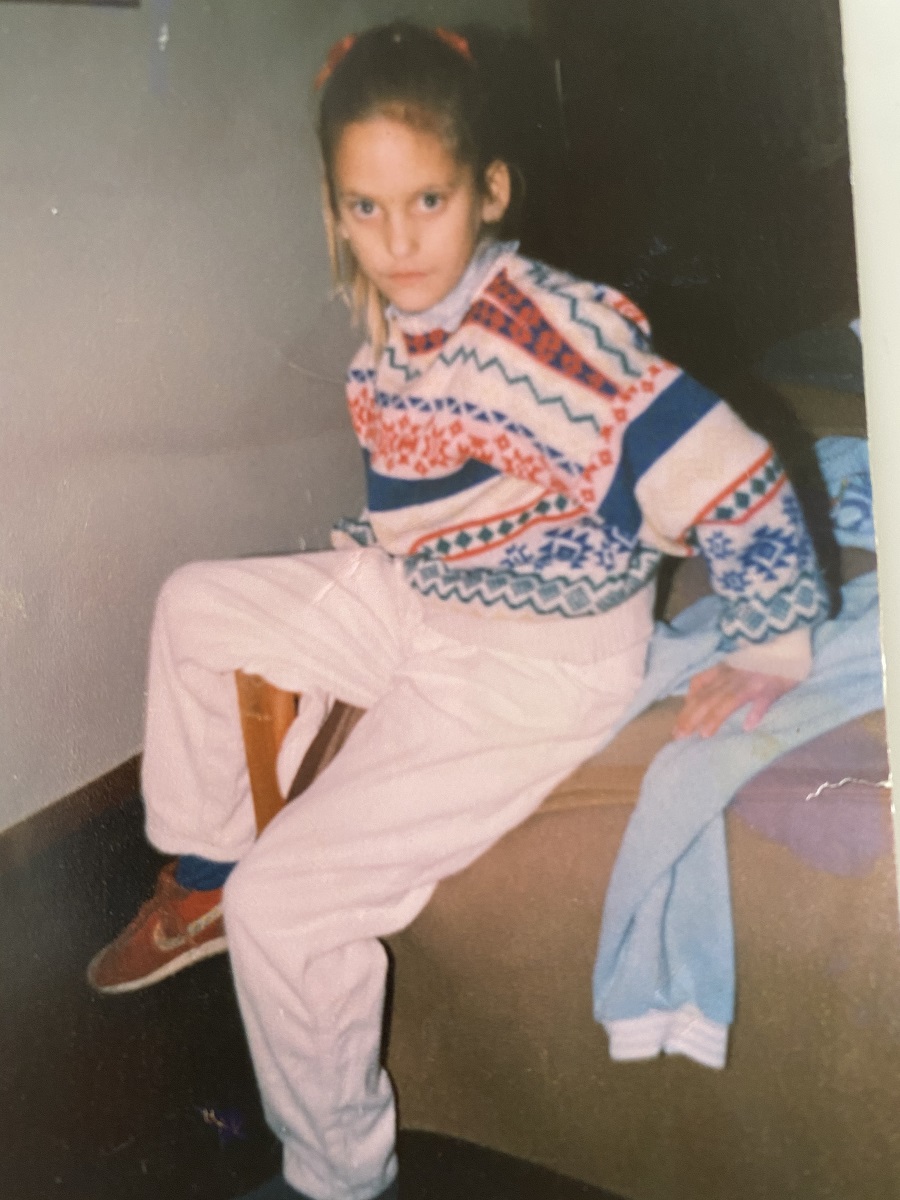
Iz toga vremena naravno pamtim i strahove. Iako je u Zagrebu bilo relativno mirno, život je bilo teško organizirati u vrijeme između uzbuna. Najteže mi je bilo dok je moja tada desetogodišnja kći još uvijek morala ići na nastavu. Znali smo da će cijena slobode biti velika, ali svejedno, sreća koja se nazirala nakon toga rata izgledala je vrijedna svega.
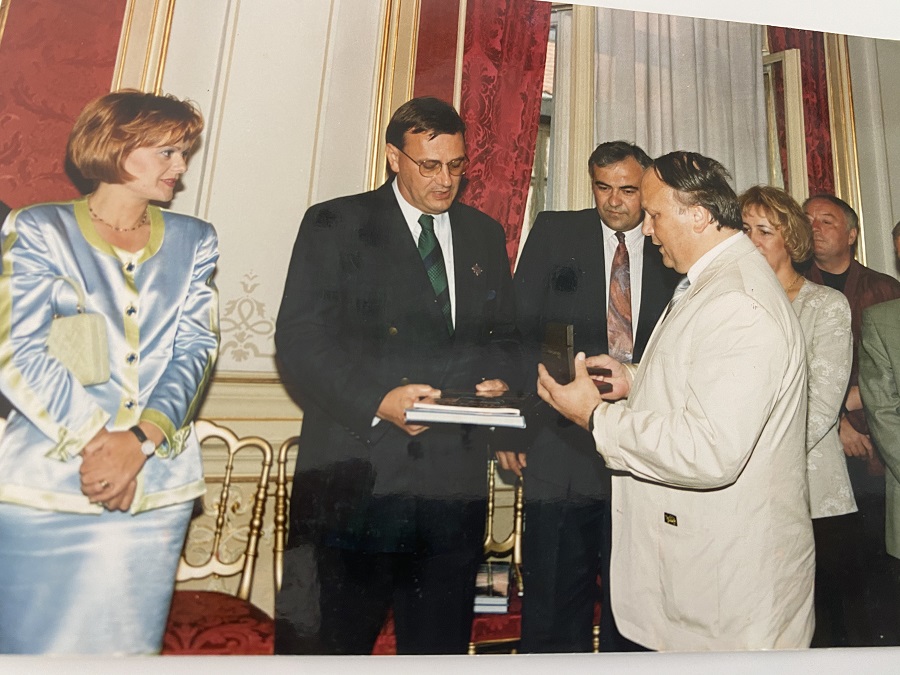
Posljedice rata bile su očekivane. Nastupilo je je dugo razdoblje prilagodbe, sporog dizanja i oporavka. Međutim, dočekali smo i bolja vremena. Razdoblje od 2000. do 2006. posebno pamtim kao vrijeme u kojem smo doživjeli ekonomski procvat. I sama sam, kao relativno mladi poduzetnik, vidjela i našla svoju priliku. U to vrijeme pokrenula sam agenciju za odnose s javnošću. Struka koja zapravo nije postojala počela je živjeti i prilike su se otvarale. U to je vrijeme u Hrvatskoj zaista bilo lijepo raditi, ali i živjeti. Dobili smo i željenu autocestu Zagreb-Split za koju su i naši roditelji izdvajali samodoprinos i koja nam je omogućila da počnemo vikende provoditi u predivnoj Dalmaciji. Iz tog vremena nosim i najljepše uspomene s naše obale, krstarenja i otkrivanja otoka, druženja i uživanja u hrvatskoj gastronomiji i vinima. Naime, među granama koje su apsolutno procvjetale otkada smo dobili državu, svakako su gastronomija i proizvodnja vina.
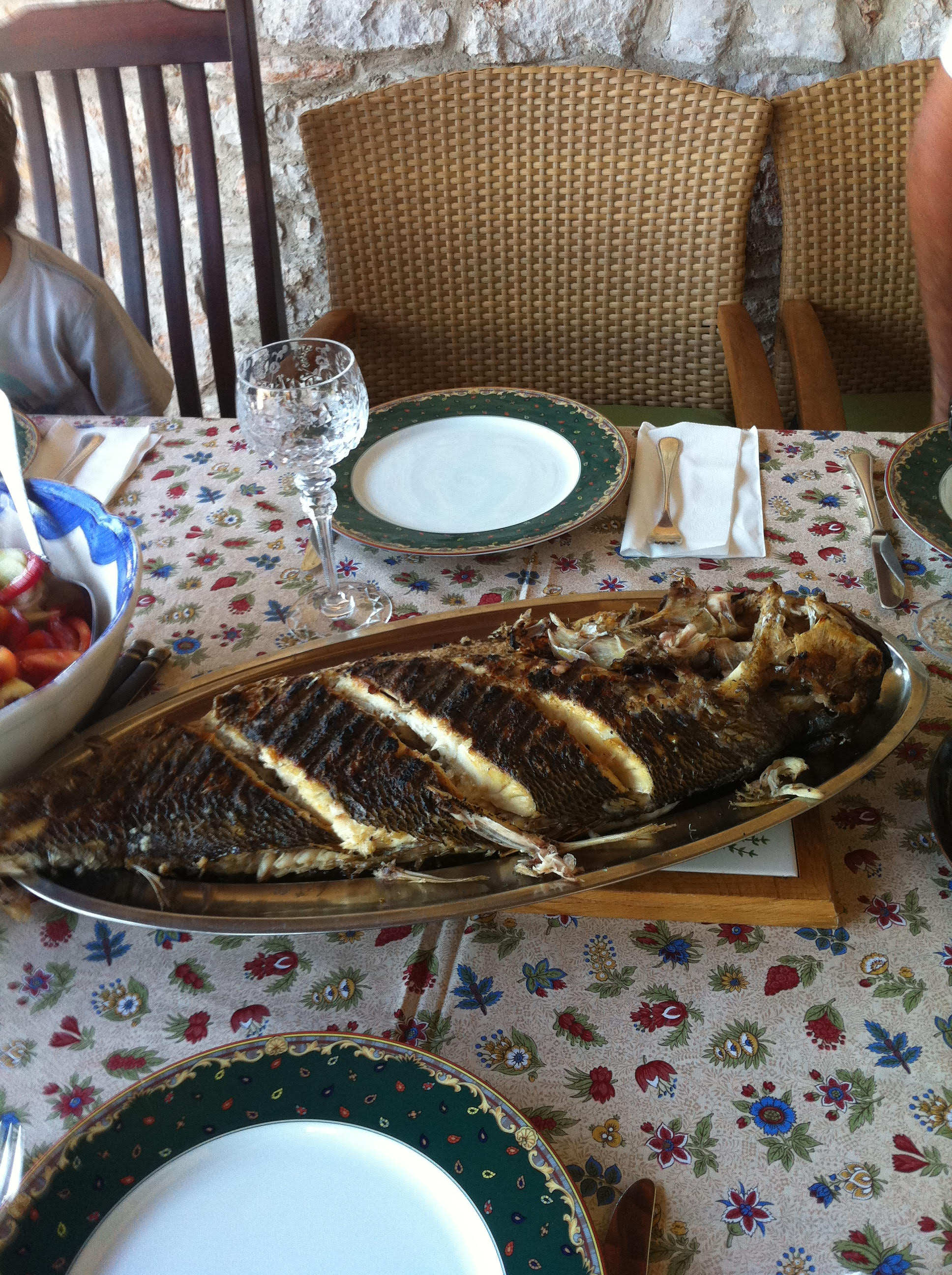
Život se sastoji od dobrih loših i dana, dobrih i loših godina. Iz svake krize trudila sam se nešto naučiti. Međutim, ova kriza koju sada dijelimo sa svijetom, nekako mi se čini najtežom do sada. Malo je onoga što mi se čini da će biti dobro nakon nje. Možda ipak jedna stvar. Hrvatska ima priliku propitati smisao glomaznog državnog aparata i pročistiti mnoge nepotrebne organizacije i agencije. Jedno malo dobro već se vidi na kraju tunela. A to je krah populističkih politika, koje su se u krizi pokazale potpuno nemoćnim.
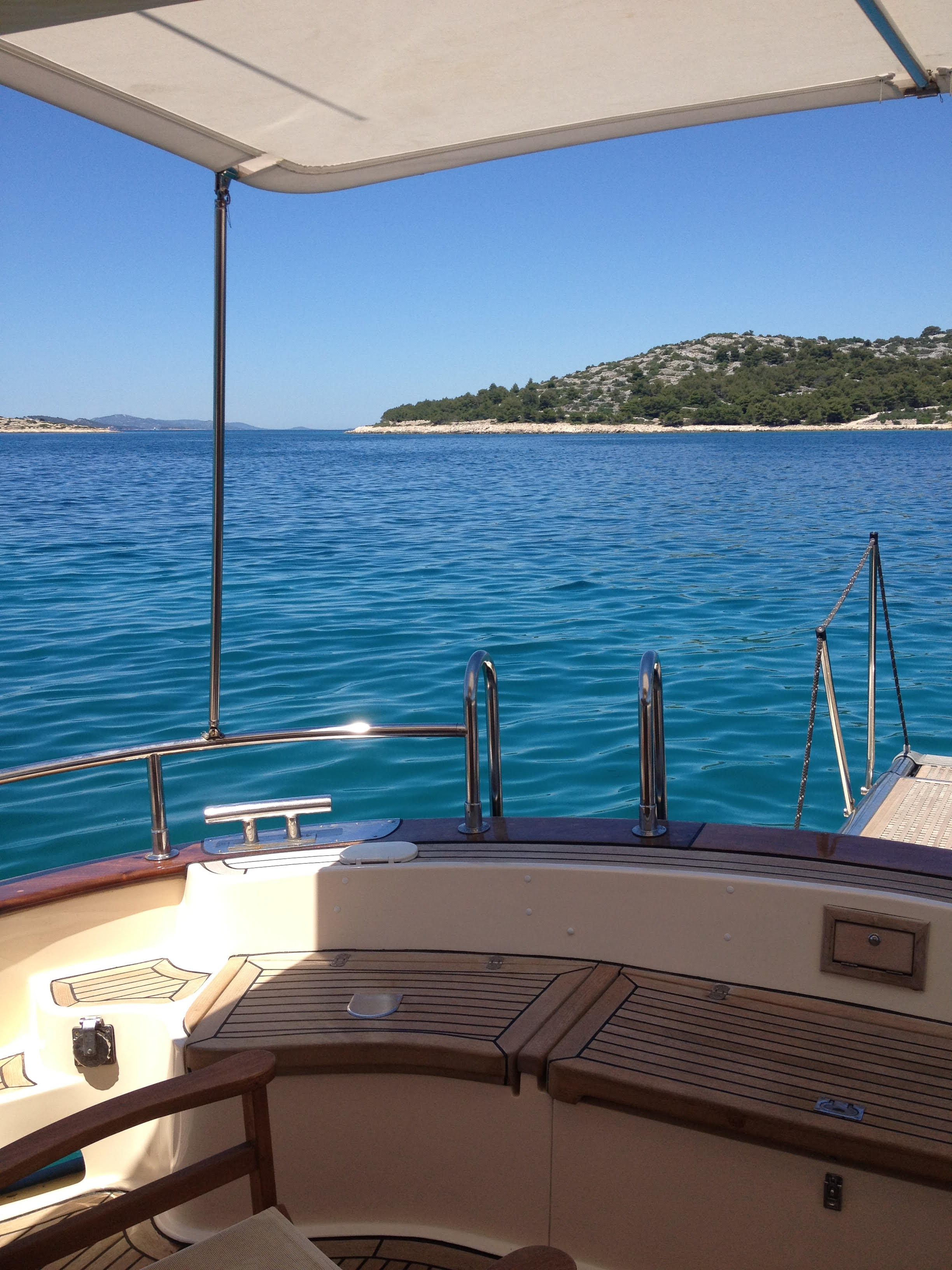
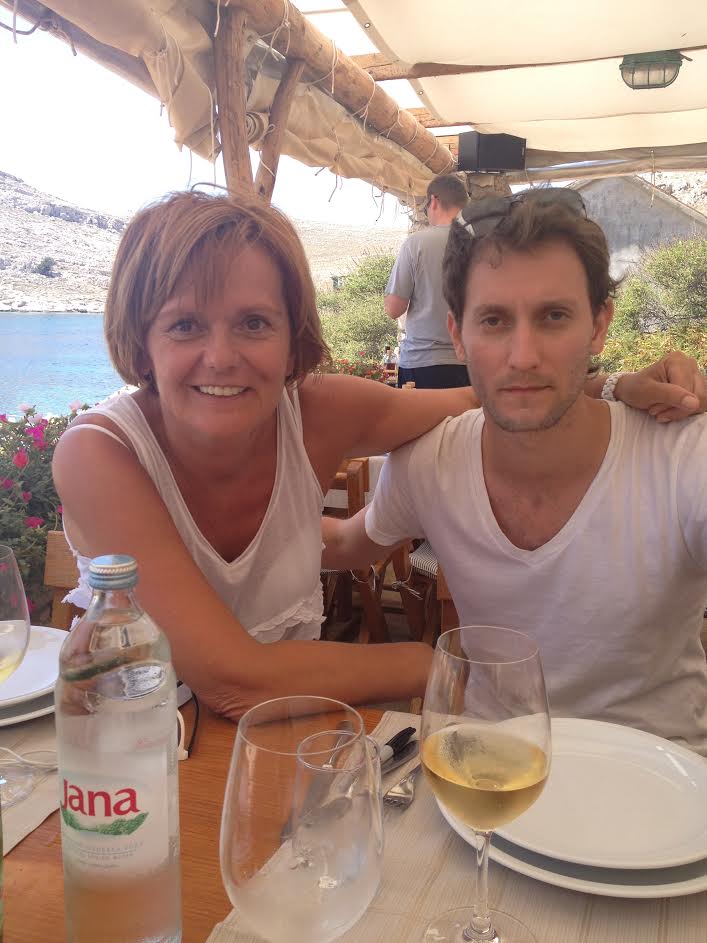
S Ankicom Mamić možete se povezati putem mreže LinkedIn.
Da biste pročitali više članaka iz jedne od naših šest serija koje smo gore spomenuli, kliknite ovdje (na eng. jeziku).
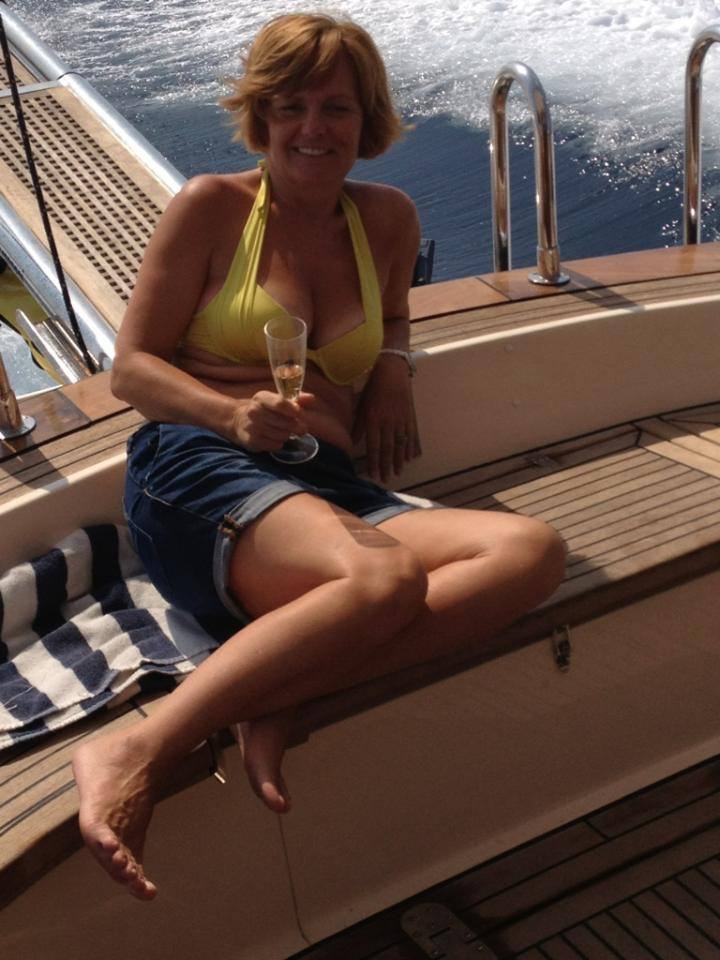
Reiner: Ruling Coalition Didn't Discuss Pay Cuts
ZAGREB, April 15, 2020 - Deputy Parliament Speaker Željko Reiner said on Wednesday the ruling coalition meeting today focused on amending the law on the protection of the population from contagious diseases and that it did not discuss pay cuts in the public sector.
"We all agreed that in this special situation Croatia, and the whole world, is exposed to a new virus that didn't exist the last time that law was passed. We must adapt it just as some ten days ago we adapted the law on civil protection," Reiner (HDZ) told reporters after the meeting.
Asked if the adjustments requested by the opposition would be introduced, he said he did not know but that amendments would be discussed if there were any.
Reiner said the coalition did not discuss pay cuts in the public sector and that, as far as he knew, there was no proposal to cut them by 20%.
He said all decisions about that should be made in agreement with trade unions and in line with financial developments.
As for the steps necessary to come out of this crisis, Reiner said Croatian People's Party president Ivan Vrdoljak mentioned that they must start talking about them and that all were for it.
More politics news can be found in the dedicated section.
"We Can!" for Control of Payment of Job Preservation Subsidies
ZAGREB, April 15, 2020 - The political platform "We Can!" said on Wednesday that the Tax Administration should be tasked with controlling how state grants for keeping jobs during the corona crisis are used by employers who are entitled to that measure.
This non-parliamentary political group thus responded to statements made by the Tax Administration head, Božidar Kutleša, that dealing with possible misuse of the funding granted under the government's job preservation scheme to employers for furloughed employees was not within the remit of the tax authority.
This political group says in a press release that it is unacceptable that public funds could be spent without control, and expresses fear that this would make it possible for employers who behave irresponsibly towards their workers to take advantage of this scheme.
Therefore "We Can!" demands that during the financial intervention in the economy the government should impose two criteria for the implementation of the grants: employers who use the funds should be expected to keep the workers on their payrolls and ensure salaries for a decent life, and they should not be allowed to make profit off those grants.
The political group also proposes that the non-payment of taxes and contributions could be implemented more flexibly which means that some of the companies that already feel the consequences of the corona crisis can be freed from the payment in the current three-month period, while those that will feel the consequences later should be allowed to be exempted from the payment any time this year.
More coronavirus news can be found in the Lifestyle section.
Foreigners Self-Isolating in Croatia: Do You Feel Safer? Francesco from Italy in Zagreb
April 12, 2020 - Do foreigners in Croatia feel more or less safe sitting out COVID-19 here than in their home country, and what are their experiences? A new series on Total Croatia News, with Francesco Mazzoleni from Italy in Zagreb as the 38th contributor.
Oxford University recently published some research on government responses to coronavirus which showed that Croatia currently has the strictest measures in the world. While inconvenient, this is a good thing in terms of reducing the spread of the virus, and I am certainly not alone in my admiration of the official Croatian handling of this crisis in recent weeks, both in terms of action and communication.
But what do other expats here think? And how does it compare with the response in their home country? Would they rather sit this one out here or there? A new series on TCN, we will be featuring expats from all over the world to see what their views are on life in corona Croatia rather than back home. So far we have heard from expats in Croatia from Romania, USA, Ireland, UK, Mexico, Argentina, Spain, Singapore, Holland, Canada, India, Hong Kong, Venezuela, Latvia, China, Honduras, Hungary, Moldova, South Korea, Japan, the Philippines and Germany. Next up, Francesco Mazzoleni from Italy in Zagreb.
Francesco actually contacted us for another reason, as well as offering us something beautiful, which you can see below, before happily agreeing to become the first Italian in this popular series.
Hi,
I'm writing to you because I am following your news and I like the way you write, but this last period we are all the time bombed with news about corona. I'm an Italian percussionist working in Zagreb and I am sending you the last video my colleague and me released with our percussion duo, in case you want to talk of something else. :)
Beautiful! Thanks Francesco. Now tell us how things are with you.
Firstly, how are you? Are you alone/with someone? Tell us a little about your situation and sanity levels.
I'm good, I'm lucky to be able to spend this time with my girlfriend in my apartment in the center of Zagreb. I'm a percussionist of the Symphonic orchestra of the radio and television (HRT) and the thing I'm suffering the most in this period is the fact of not being able to make music as we were used to.
For this reason, I decided to change my musical routines to arranging new music for my percussion duo and contacting composers from Italy to start a project of new music for our duo, to use this period as an opportunity for creativity.
Besides this I'm spending a lot of time exploring new things, such as cooking as never before, films, painting, listening to music, reading and practicing yoga every day helps to keep me sane and discover who I am.
When did you realise that corona was going to be a big issue?
I realized it was going to be a big issue when I saw the numbers raising exponentially in Italy. It's hard to understand what's going on when things happen so fast.
What is your impression of the way Croatia is dealing with the crisis? How safe do you feel?
I think Croatia is dealing with this crisis in the best possible way. Learning from the mistake of Italy of not closing activities and schools when the numbers were still low, Croatia acted on this very early and this is helping to have a low spread of the virus compared to other countries.
I feel safe with the decisions the government is taking.
Now compare that to your home country and how they are handling it. What is Croatia doing better/worse?
Italy, unfortunately, was the first European country that got attacked by the virus and for this reason, the measures of prevention taken were delayed, causing what we are seeing in these days.
Croatia acted on it in time, and the situation here is much better.
What about official communications from the authorities, compared to your home country?
In this aspect I think the authorities of both countries are dealing with it in a good and calm way, taking the situation as it is and giving it the importance it should have.
What's the one thing you wish you had taken with you into self-isolation.
My family and my friends.
One thing you have learned about yourself, and one thing you have learned about others during this crisis.
I have learned where to put the focus in my life. The fact of slowing down the rhythm of actions we do each day, the point of life is to enjoy what we do and feeling a whole with our surrounding whatever and however it is.
About others, I have learned that in a situation of difficulties, we can count on each other and we have to trust others to create a better future together.
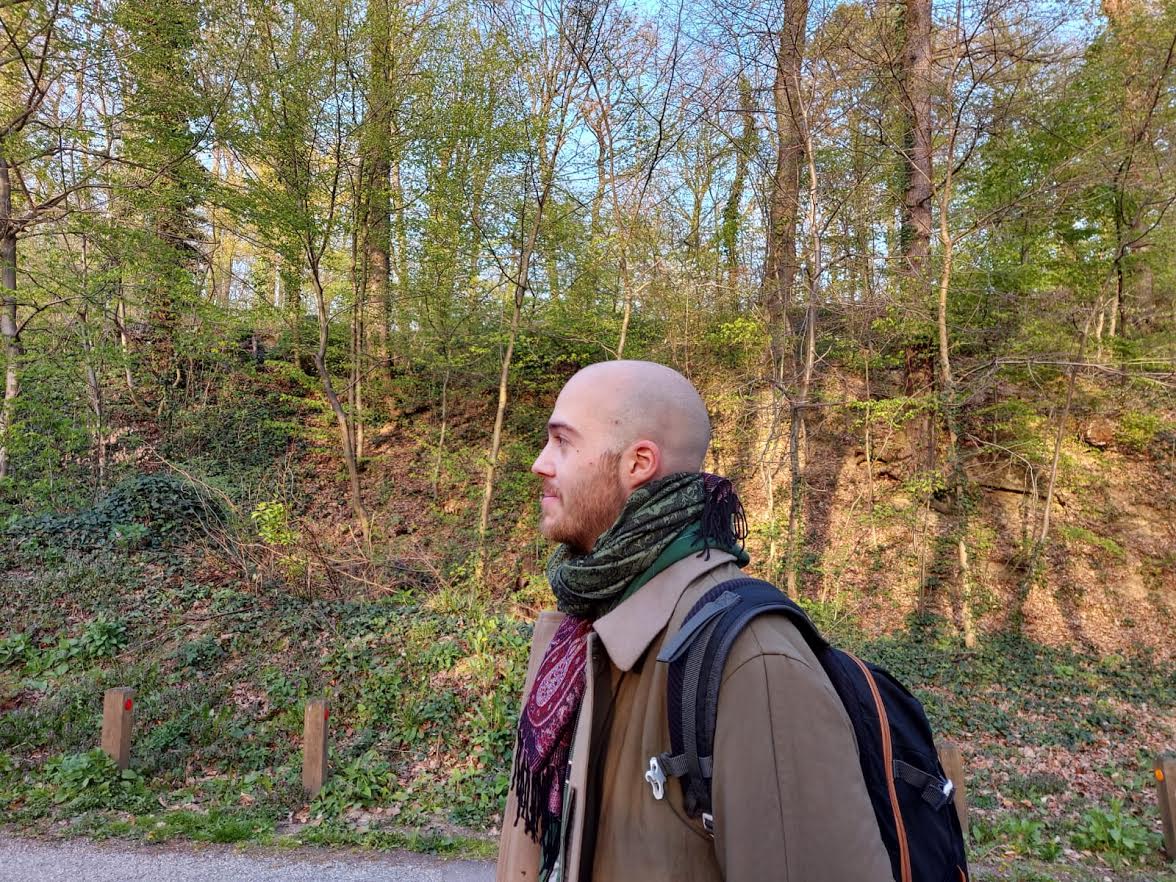
Thanks, Francesco. Stay safe and see you on the other side.
TCN is starting a new feature series on foreign experiences of sitting out COVID-19 here in Croatia compared to their home country. If you would like to contribute, the questions are below. Please also include a para about yourself and where you are from, and a link to your website if you would like. Please also send 3-4 photos minimum to This email address is being protected from spambots. You need JavaScript enabled to view it. Subject Corona Foreigner
If you would be interested to record a video version for our partners www.rplus.video please let us know in the email. Thanks and stay safe.
Foreigners Self-Isolating in Croatia: Do You Feel Safer Than in Your Home Country?
Firstly, how are you? Are you alone/with someone? Tell us a little about your situation and sanity levels.
What do you think about the economic measures the government is taking, are they helping your business? (PLEASE IGNORE IF THIS DOES NOT AFFECT YOU)
When did you realise that corona was going to be a big issue?
What is your impression of the way Croatia is dealing with the crisis? How safe do you feel?
Now compare that to your home country and how they are handling it. What is Croatia doing better/worse?
What about official communications from the authorities, compared to your home country?
What's the one thing you wish you had taken with you into self-isolation.
One thing you have learned about yourself, and one thing you have learned about others during this crisis.
TCN has recently become a partner in Robert Tomic Zuber's new R+ video channel, initially telling stories about corona experiences. You can see the first TCN contribution from this morning, my video from Jelsa talking about the realities of running a news portal in the corona era below. If you would like to also submit a video interview, please find Robert's guidelines below
VIDEO RECORDING GUIDE
The video footage should be recorded so that the cell phone is turned horizontally (landscape mode).
There are several rules for television and video news:- length is not a virtue- a picture speaks more than a thousand words
In short, this would mean that your story should not last more than 90 seconds and that everything you say in the report should be shown by video (for example, if you talk about empty streets, we should see those empty streets, etc.).
How to do it with your cell phone? First, use a selfie camera to record yourself telling your story for about a minute and a half. Ideally, it would be taken in the exterior, except in situations where you are reporting on things in the interior (quarantine, hospital, self-isolation, etc.). Also, when shooting, move freely, make sure everything is not static.
After you have recorded your report, you should capture footage that will tell your story with a picture, such as an earlier example with empty streets.
One of the basic rules of TV journalism is that the story is told in the same way as a journalist with his text. Therefore, we ask you for additional effort. Because we work in a very specific situation, sometimes you may not be able to capture footage for each sentence of the report. In this case, record the details on the streets: people walking, the main features of the city where you live, inscriptions on the windows related to the virus, etc.
The same rules apply if you are shooting a story from your apartment, self-isolation, quarantine. We also need you to capture footage that describes your story.
When shooting frames to cover your reports, it is important that you change the angle of the shot (in other words, shoot that empty street from several angles). Also, when shooting a detail, count at least five seconds before removing the camera to another detail.
The material should be about 5 minutes long (90 seconds of your report + frames to cover your story).
After recording everything, send us to Zagreb, preferably via WeTransfer to This email address is being protected from spambots. You need JavaScript enabled to view it.
Wash your hands.
When Was Your Golden Era of Life in Croatia? Ankica Mamic in Zagreb
April 15, 2020 - So when your golden era of life in Croatia? A new series looking back to happier times through the eyes of Croatia's residents. First up, long time TCN fan and cook extraordinaire, Ankica Mamic in Zagreb.
I have had many requests to add different content - preferably happier - to mix up with the corona misery. I hear your pain. If you think constantly reading corona news is draining, spare a thought for those whose job it is to report on it all day.
So here is an idea, and I am very grateful to my good friend Ankica Mamic for giving it such an excellent start - When Was Your Golden Era of Living in Croatia?
A few weeks ago, we started a series called Foreign Self-Isolation Stories: Do You Feel Safer? asking expats locked down in Croatia comparing how Croatia was handling the situation compared to their home country. We have had almost 40 great interview responses so far, from Hong Kong to Honduras, China to Mexico, and Japan to New Zealand.
The next logical extension was Corona Voices in the Diaspora, checking how Croatians abroad were faring where they found themselves, compared to back in the Homeland.
And then, to try and add a little happiness, we started Expats in Isolation: My Top 10 Experiences in Croatia.
You can find all these, along with the submission guidelines for each section, underneath the interviews in the individual articles in this section.
But I also wanted to find a way for people living in Croatia to reflect on happier times, so we thought we would try with a series looking at people's recollections of their favourite era living in Croatia. If you would like to contribute, please send your text, 4-6 photos, an intro paragraph about and (if you want) a link to your website to This email address is being protected from spambots. You need JavaScript enabled to view it. Subject Golden Era.
And now, let's hear from about the golden years from Ankica Mamic.

Croatia is a beautiful country and if we were to talk about the beauties and advantages of living in it visible only to the eye, the list would indeed be exceptionally long. However, it’s not only the “outside” that is always beautiful. Some of the nicest memories happen when life and business, personal and one’s general goals are achieved.

I would like first to go back to the late 1980s, a time marked by the fall of communism and the rise of a centuries-old desire of having one’s own country. I was mature enough then but also still young, harbouring elation and passion, to experience and comprehend those events. I practically “lived on a diet” of news, followed all the talking points and events, and impatiently anticipated the next bit of news. Unfortunately, we quickly realised that achieving our dream was going to be difficult and painful. The war began and our lives changed overnight. Nonetheless, that difficult period of life brought about so many nice things. A sense of community, as well as devising and seeking solutions to life’s problems. Gathering in the basements of Zagreb restaurants were groups of people who in various ways wanted to give their contribution. I joined them with much enthusiasm and developed a closeness with those people who had a positive influence on my life and who quickly became important to society. Most of all, I was able to learn a lot from them because they inspired me to seek the best within me.

I also recall the fears I experience at that time. Though Zagreb was relatively peaceful, but organising life under the sound of sirens proved to be difficult. I found it especially worrisome that my daughter, who was ten years old at the time, had to attend classes. We knew that the price of freedom was great but, nonetheless, happiness that seemed to be dawning after the war seemed to have been worth it.

The consequences of war were as expected. A long period of adjustment ensued. The return to normality and recovery was slow. Fortunately, we lived to see better times. I especially recall the period from 2000 to 2006, a time of economic boom. I myself, as a relatively young businesswoman, identified and took advantage of those opportunities. During that time, I founded a public relations agency. It was a profession which, in all practical terms, had not existed yet, but opportunities began to appear. Living and working in Croatia during that time was really gratifying. In time, we eventually got our long-awaited Zagreb-Split motorway, for which our parents had been paying state contributions, and which finally enabled us to spend weekends in beautiful Dalmatia. It is from that period of time that I carry my fondest memories of the coastline, sailing and discovering Croatia’s islands, socialising as well as enjoying Croatian cuisine and wines. Indeed, the parts of the economy that experienced a boom since Croatia’s independence definitely included Croatian cuisine and wines.

Life is made up of good and not so good days and years. I always endeavoured to learn something in any crisis I encountered. However, the current crisis we are now sharing with the world, somehow seems to be the hardest of them all. I wonder what little goodwill possibly come of it after it has passed. Perhaps there is something. Croatia now has the opportunity to examine the reasoning behind its huge state apparatus and cleanse itself of the many unneeded organisations and agencies. A small light at the end of the tunnel is the collapse of populism, which has been proven to be completely powerless in the current crisis.


You can connect with Ankica Mamic via LinkedIn.
To read more in any of the four series mentioned above, click here.

Post-Corona Tourism Planning: Lessons from Portugal & South Africa
April 15, 2020 - Are countries making plans for post-corona tourism? Should they be? Some interesting approaches from Portugal and South Africa.
Spending so much time online, I tend to follow things that do not overly concern me, and one of the things that I have taken more than a passing interest in recent years is the social media crisis response to disasters.
Remember the cruise ship and the erupting volcano on White Island in New Zealand? That was just four months - and many lifetimes - ago. As my lovely Russian sister-in-law was working on the ship, I followed events very closely, and I was very surprised to see the Facebook activity on the main cruise ship company page with its almost 5 million followers. The ship has its own Facebook page and posted a touching note about the tragedy, as well as a poignant video as the ship left the harbour a couple of days later.
But the main page? Absolutely nothing at all. For 9 days. And then, on December 17, 2019, when a post finally appeared, it was as though nothing had happened and the FB admin had taken some time off for a holiday. But I am not a crisis communications expert, so perhaps that is the way to deal with the situation.

The subject of post-corona travel is a complicated one to deal with. With so many people in lockdown, and with tourism so intangible at the moment, never mind the impending economic crisis, there are those who say we should not be talking about tourism at all at this time.
And perhaps they are right.
The thing is, though, tourism is more than 20% of Croatia's GDP, and while tourism may well be different on the other side, tourism will be an essential part of Croatia's economic recovery. And so it makes sense (to me at least) to start planning for scenarios.
This is an unprecedented situation in our history, where a significant portion of the world is at home with time on its hands, with only two real escape routes from the current nightmare - memories of the past and dreams of the future.
I don't think I am alone in that I have some INSANE longings for things that I can't have right now - and the photos of the fabulous steaks from Durina Hiza were driving me crazy until owner Nikola Bozic announced a nationwide steak (and other products) delivery service.
Should we be trying to create that desire and connection to future tourists at the moment, or all lockdown and forget about the world until it returns to a semblance of normality?
I personally think that creating engaging content about destinations now will sow seeds of interest for the future. I am very aware that we are more fortunate than many with our current setup on Hvar, after we decided to see this one out at our Jelsa home (after we lost all our bookings), and I am conscious that posting gorgeous images and photos by the sea can be torture to some. But I have been overwhelmed with messages of thanks and requests for more by so many people who plan to visit Hvar as soon as they can.
Easter Sunday was extraordinary, with people not on Hvar tagging their friends so they could hear the bells ringing on Easter Sunday.
So what is happening at the national tourist board level around the world? Is anyone taking a proactive approach to preparing for post-corona tourism? YES! Here are two very interesting promotional tourism videos put out in the corona age.
South Africa Tourist Board
Portugal Tourist Board
The response by the Croatian National Tourist Board to the Zagreb earthquake was magnificent - see this video posted on its Facebook page the same day. Very impressive.
Regarding post-corona tourism, however, I have seen absolutely nothing proactive in the way South Africa and Portugal have responded. Indeed, it seems that they are still formulating a plan, according to today's news - Croatian National Tourist Board Discusses Impact of Coronavirus Pandemic.
Getting the post-corona tourism strategy right is going to be essential for the Croatian economy, as competition for the diminishing number of tourists who will travel will be insane.
Let's hope Croatia comes up with the right formula.
For more insights into scenarios for post-corona tourism, you can check out this thought-provoking series from Zoran Pejovic from Paradox Hospitality.
Vese Huljic, AndAdventure: Will Travel Industry Be Changed When All is Said and Done?
April 15, 2020 - Reflections from one of Croatia's longest-serving adventure tourism professionals, Vese Huljic from AndAdventure in Split.
A few weeks ago, before the world changed several times, I contacted one of my favourite people in the Croatian tourism industry - Vese Huljic, from And Adventure in Split. A Jelsa girl, I have known Vese for years, from the start of Total Hvar back in 2011. Her story is very impressive, one of the founding members of a new adventure tourism business back in 2005 - an era when many people in Croatian tourism had no idea what adventure tourism was.
Years passed, and I realised that not only had adventure tourism in Croatia come on leaps and bounds, but Vese had been at the forefront of that change and progress for 15 years now. I messaged her to see if she would be interested in an interview.
She replied that things were getting crazy with corona and cancellations and she would get back to me.
And get back to me she did, this morning, several weeks and several lifetimes later, with THIS, posted on her website.
About a month ago, a dear friend of mine who manages a popular Croatia news blog asked me for my insight, as he was working on a story about AndAdventure. The request came just as the global impacts of COVID-19 began to change our lives–personally and professionally–as we know it. In the travel and tourism industry, no one is being spared from disruption.
To buy some time, I told him that I need to rethink my career. But realistically, there is not much to rethink, because when you love what you do–when you deeply care about your team, and the suppliers that depend on your business–the only thing to do is focus on preserving what we have, reimagining what we can, adopting to the constant changes, and getting ready to move forward on the other side of this. Every day, new questions arise and in most cases, we don’t have answers; the moment we think we have figured something out, another development resets our course.
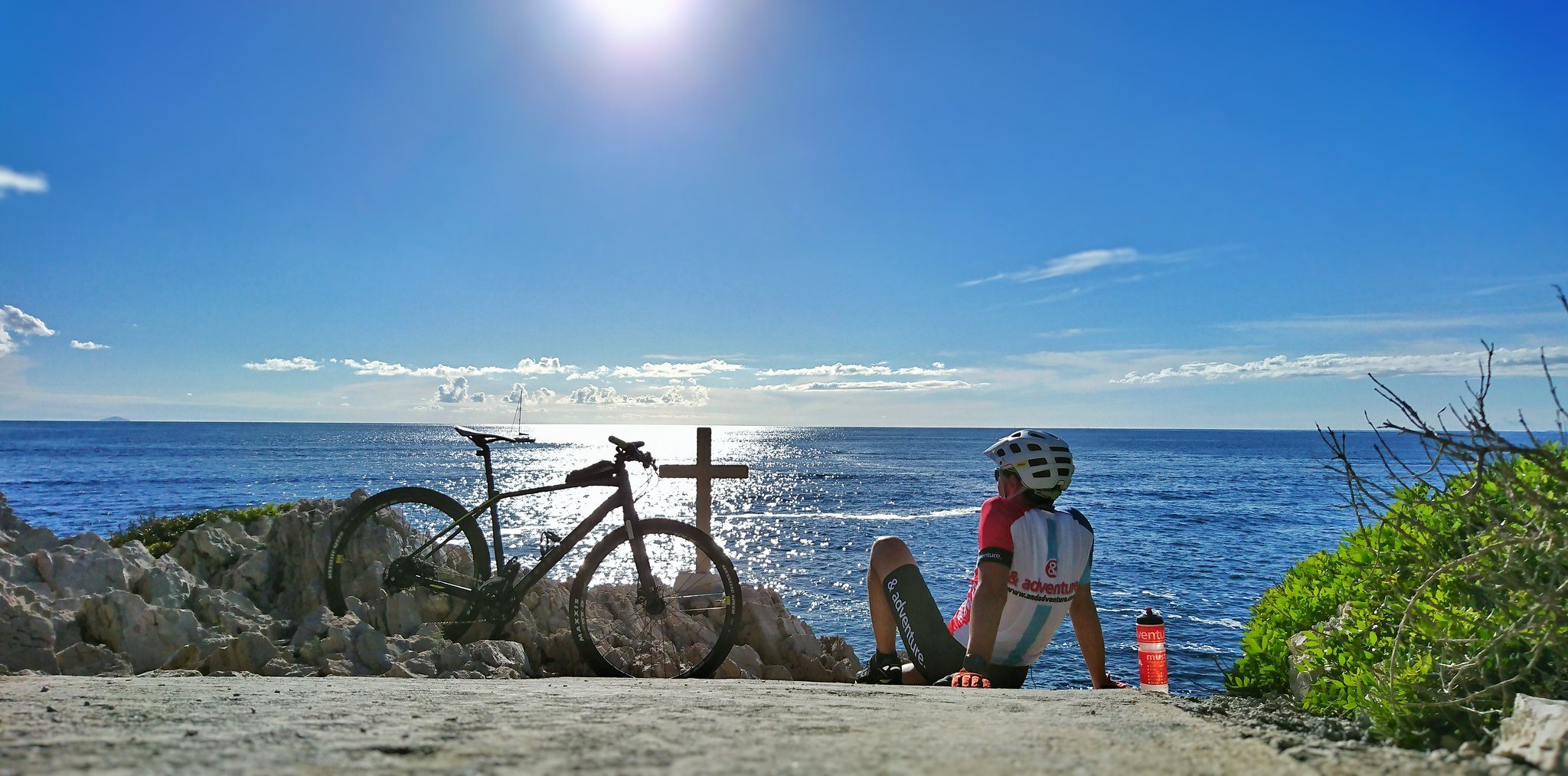
When will this end? We don’t know. Will the travel industry be changed when all is said and done? Probably, but we don’t know for certain how, though there are many ideas and perspectives circulating that we can consider as we find a path forward. Still, there’s an opportunity in the meantime to take stock of what we do know and what we can observe of Covid-19’s impact on the planet, and adjust accordingly. If anything good is to come out of this, perhaps it’s our chance to do things better.
Nature is healing
Being an adventure-oriented company, the great outdoors is our sanctuary; respecting and immersing ourselves in all of nature’s glory is where we find our joy. I enjoy seeing positive news stories and social media posts about wildlife reclaiming their territory and reports on less pollution due to a slow down of industrial production and traffic, etc. We can’t wait to get outside again.
Overtourism
Not so long ago, this was one of the biggest challenges of Croatia’s most popular destinations, and there was no clear solution (or, maybe fair to say the associated revenue was a deterrent to consider our options). In today’s climate, “overtourism” has become a long-lost concept; hopefully, gone but not forgotten. Our lessons learned and the negative impacts of overtourism well-documented, we are in a better position than ever to integrate and enforce green, sustainable practices to all we do. As an active and adventure travel business, this is core to our existing ethos; small group tours leaving minimal impact and few traces of our presence in the areas we operate while supporting locally-owned businesses to strengthen community success. Now, we’re looking at how we can innovate further. Let’s hope that with this reset, more key industry players take-up–and follow through with–a better way of doing things so overtourism will be nothing more than a thing of the past.
We were given time
It’s a precious commodity that most of us missed desperately when business was in full swing; we always needed more of it–time to enjoy with our families, kids; time to finally read that book or finish that online course that’s been on file for years; or even to pair all the Tupperware boxes with matching lids. Now, we have that time. It’s an opportunity to rethink our lives, careers and goals. To reimagine our businesses to be more sustainable and nature-oriented. Indeed, we also have time to be sad; to feel the uncertainty about the future and for stress to numb our creative power. But when you can, choose motivation, optimism and hope–because even the darkest patch can be a beautiful turning point.
I still owe my friend answers to the long set of questions he sent me, not because I feel that timing might be wrong to publish our story – but because I believe this is the time we all need to reinvent ourselves, assess our businesses and our goals, and redirect our creative energy so we could deliver better, greener and more sustainable experiences when we’re finally able to welcome our clients to beautiful Croatia once again. When that time comes, I will be happy to share the journey of AndAdventure, which will be made richer for the experience of overcoming challenges and adapting to a new reality.
In the meantime– to my team and of our suppliers with whom we’ve created so many amazing AndAdvenure experiences, to our partners who are facing the same struggles, and to our precious clients who are supporting us in so many different ways, thank you. We will sail through this storm together.
You can connect with Vese Huljic and the AndAdventure team through their official website.
For the latest on Croatian tourism, click here.
European Capital of Culture: What Will Remain of the Rijeka 2020 Program?
April 15, 2020 - Rijeka's head of the Department of Culture, Ivan Sarar, discusses the impact of the coronavirus pandemic on the Rijeka 2020 program.
In these challenging coronavirus times, the cultural sector is strongly affected, but since it shares the fate of other sectors, it does not seem to enjoy much public discourse.
In this context, Rijeka is living a unique story. What was supposed to be a cultural feast in the year of the European Capital of Culture - when we expected to hold debates in ideological, sociological, ethical, artistic, critical-theoretical and other conversations - became the burial ground of culture where victims are collected.
Rijeka's head of the Department of Culture, Ivan Sarar, interviewed with Novi List to discuss the impact of the pandemic on the Rijeka 2020 program.
In an interview with Novi List, the Minister of Culture announced that the Ministry would not be able to pay the agreed financial support to the ECOC. What is the amount?
"It is still unknown how much the Ministry of Culture's financial support will be for the ECOC project."
In terms of the City of Rijeka's financial obligations to the ECOC, what, or how much, will be the issue?
"Over the past three weeks, the City of Rijeka, in response to the coronavirus pandemic, and in an effort to help outright disadvantaged private sector businesses, has taken a number of measures that directly affect the city budget cuts. Similarly, the measures were also adopted by the state, also with regard to reducing the liabilities of the economic sector, which also has a direct impact on filling the income tax budget. So there is only one thing in such uncertainty: there will not be as much funding for the ECOC program as originally planned. And it is impossible and ungrateful to give concrete figures at this time."
Rijeka 2020 announced the restructuring of the program. What are the requirements of the Rijeka Department of Culture in terms of deadlines? When does Rijeka 2020 have to come up with a new proposal and in what direction will it go, to your knowledge?
"The program, which began on 1 February 2020 and was to run until 31 January 2021, is planned, prepared and organized over four years. Now it needs to be redesigned, significantly reduced, revised to over 250 program activities that originally had to include more than 600 events in a very short time.
Basically, a significant reduction in the overall budget should have been foreseen, but through certain logical criteria that we discussed earlier. Rijeka 2020 completed this first revision this week with several possible scenarios.
I was personally involved in this review, the first proposal was also submitted to the City and will be sent to the Ministry of Culture. It is certainly not the final document, and it does not constitute a definitive list of the programs of the "new ECOC", but is the basis for further discussions between the City, Ministry, PGZ, Rijeka 2020 and the partners involved.
The biggest challenge we all face is not really the number of programs or funding, but the total uncertainty surrounding the pandemic, which cannot be influenced by anyone, and it directly concerns the number of programs and future available resources and the timeframe for implementing any programs withheld. I'm saying that it concerns the audience themselves on those programs. Because it is perhaps crude to predict when the situation will normalize, it is much harder to predict the extent to which people will regain old habits and what their behavior will be, but also the expectations of citizens."
Are the infrastructure investments of "Bencic", "Galeb", and "Exportdrvo" in question? Are the European funds for "Bencic" and "Galeb" in question?
"So far, infrastructure investments are not in question. They have their own dynamics of work and payments, they are financed with significant amounts of EU funds and there are no major problems in this part of the project. The Sugar Palace and the Children's House are already in an advanced stage of construction before all work is completed.
We are facing smaller mobility issues and smaller delays in the delivery of materials and parts that have been ordered from abroad, but it is likely that these facilities will not be open to the public before the termination of the measures of reduced social contacts, or before the real possibility of offering ongoing program activity."
How much has the City of Rijeka disbursed approved funds to the users of Public Needs in the Culture of the City of Rijeka for 2020?
"There were no payments for public needs this year."
What is the debt of the City of Rijeka regarding the public needs before 2020?
"The City of Rijeka's debt to the beneficiaries of the 2019 Public Needs Fund is HRK 315,000."
What policy will you take to maintain approved programs, which have all been delayed, and disbursing funds for approved programs?
"The budget for public cultural needs for 2020 is around HRK 3.5 million. Given the liquidity of the overall budget in the new circumstances, we will strive to maximize payments for all programs held so far, including debt for the previous year. With regard to approved programs, it is certain that due to a budget deficit, we will have to go for a reduction in funding. We are just finalizing the priority criteria by which we will reduce program resources. We intend to maintain stability within the cultural sector in such a way that priority will be given to associations that have employees, freelance artists and all those projects where the financial structure suggests the existence of existential well-being for actors in the urban cultural scene."
What are the budget estimates for next year's Department of Culture, given the new situation with the coronavirus crisis?
"It is impossible to predict the budget for 2021 at this time; we still do not have any input from which to know what the financial framework is. The only certain thing is that it will be very tight. But it's too early to say how much.
We are currently considering urgent measures to run the projects as normal in the current year, as well as considering several models for the survival of the ECOC as Croatia's largest cultural project."
What measures are you taking in the Department of Culture to protect self-employed artists, small businesses in the cultural and creative sectors, and the self-employed, whose livelihoods are already threatened?
"Measures have been adopted on a city-wide basis for all those who cannot work in these conditions. The mayor also announced the possibility of extending measures to monitor the situation. These measures now relate to deferrals and write-offs - rents, utility bills, monumental rents, surtaxes and more. I partly answered this question in my earlier answers, as well.
As far as the self-employed are concerned, the City of Rijeka has not foreseen direct financial assistance in any crisis measure so far. We are in intensive communication with the Ministry of Culture, which has opened several lines of measures to assist the self-employed so that we can eventually contribute to this segment. The problem in this is the considerable clutter in the records as well as the very difficult job of defining the criteria for assistance that should be determined on a case-by-case basis.
On the other hand, this topic is, to a considerable extent, actually emerging from the cultural policy domain and entering the social policy domain. But I repeat, we will certainly do our utmost to maintain the continuity of payments to all who fall into the domain and have described your matter through the payment of public cultural needs. We are working on the decision to introduce rent-free studios and cultural associations."
Will there be any changes in the staffing structure of the Department of Culture and will salaries will be reduced in both the Department and public cultural institutions that are under the jurisdiction of the City of Rijeka?
"As things stand now, given the real state of budget cuts caused by this situation, it is likely that salaries will be reduced at the level of the city government, both in the city administration and in budget users and in Rijeka 2020."
To read more about lifestyle in Croatia, follow TCN's dedicated page.
Plenković: Biggest Task Is Fighting Pandemic's Socio-Economic Fallout
ZAGREB, April 15, 2020 - Prime Minister Andrej Plenković said on Tuesday the government's biggest task was to fight the socio-economic fallout of the coronavirus pandemic, asking all ministers to make economies and underlining that the burden of this crisis must be borne with solidarity.
Speaking for the public broadcaster, he said rationalisation was the main concept and that ministers would have to plan in stages how to reactivate the economy in line with health and safety guidelines. "We don't want to fall into the trap of lightly easing something and then having new infection hotspots."
Plenković said the uncertainty of the pandemic's duration was the key problem of the crisis as no one knew when a vaccine would be found or immunity acquired.
He said he would do everything for the state to function as much as possible while primarily seeing to citizens' health. "It's not just a common sense obligation of the government but a constitutional category as well."
Plenković said he was satisfied with the results of the second set of measures to help the economy and that some 100,000 companies had applied for aid to keep jobs.
Speaking of the third set, he said the government today tabled a bill to enable a stay on the enforcement on physical persons' monetary funds for the duration of the crisis.
He said the government's measures had been planned for a period of three months and another three if the crises continued.
Asked if the crisis would delay Croatia's introduction of the euro, he recalled that Croatia adopted a euro introduction strategy two years ago and that it would complete an action plan next month. He said the pace might be somewhat affected but that Croatia remained committed to that goal.
Plenković said that if Croatia were in the euro area, there would be no pressure on the kuna now and the European Central Bank could do for it what it was doing for all euro area member states. "In a way, we would be secured."
He went on to say that this situation was an opportunity for a new start not just by the government but all of society as it provided "a fresh look on what is really good and what isn't good."
"We must strike a balance between understanding the role of the state and some chubby state which perhaps has taken more than it should. That's the key before us."
Asked about the objective of amendments to the law on the protection of the population from contagious diseases, Plenković said they proposed that instead of the minister of health declaring an epidemic as was the case now, it would be better if the government did it.
The amendments will also specify the link between activities related to an epidemic from the aspect of the Health Ministry and what the national civil protection authority and the government do, he said. "Since no one has been faced with such a situation yet, we have realised that it demands also improving legislation."
Asked if they had worked out a plan in case the coronavirus pandemic were to last long, the prime minister said the restrictions could not be limitless so they would try to work out a plan allowing the reactivation of certain industries but in a different way, within "an epidemiological framework."
Speaking of Croatia's presidency of the Council of the EU, Plenković said the wish was to find a common European response to how to coordinate while living with COVID-19 and acting better after COVID-19. "That will be our wish for June, that we come out of this stronger."
The European project can survive this and after the pandemic everyone will draw certain lessons and now there will be more focus on preparing crises response mechanisms, he said, adding that Europe was a strong project and that key parties, with Croatia's contribution, would work on making it stronger.
More coronavirus news can be found in the Lifestyle section.
Online Schooling in Croatia 1 Month On: 5 Teacher Views
April 15, 2020 - It is almost a month since online schooling became the new education norm in Croatia. TCN intern Janja Sestak talks to five teachers to understand their perspectives.
Students, professors, even parents - all of them are going through something they have never experienced before. While students enjoy waking up a bit later than usual, they struggle with much more work. While teachers get attacked that they are doing less than usual; some of them have spent 10 hours per day in front of their laptops trying to do their best. While some parents are going insane with their children at home, they message teachers, telling them they can't do the homework because their kid is unbearable.
As I am a student myself, I can say that is true - we do have much more work to do. Then again, we do not go to lectures (and not every single professor holds an online lecture), so I believe we are about the same as before. Most of my professors are doing a fantastic job, and I am grateful for that. Yes, it was a bit confusing at the beginning, but just because it was something new for all of us.
Unfortunately, reading comments on social networks, a lot of people at this time of online schooling, still don't understand what it is like to be a teacher. There are many of them who did not leave the best impression in our heads of themselves, of course. But in this piece, I want to show you what it is like currently to be a teacher - in primary school, high school, and an assistant on faculty, and how are things handled by the headmaster of a primary school.
I spoke to five people, and one of them wanted to remain anonymous. I will start with that person, and I will call him John.
John is a form teacher in primary school, handling two classes at once because there are not enough children to split the class. Maybe you are asking yourself: "How can someone teach children of the second year while at the same time, in the same classroom, there are children from the fourth grade?"
Well, a lot of things are possible here.
One of the very first things John said to me is that this type of schooling is not the solution. "It seems like we are not doing anything because there are lectures on television. What is worse, lectures on television don't match the ones where we stopped."
Teachers who are teaching from first to fourth grade in primary school are not required to hold online lectures. But still, John has made a web page for his pupils and their parents, to make things easier for everybody. He puts all the work material on it, and for now, everything is under control.
My second source is a teacher who also works in primary school, but she teaches the Croatian language to children from fifth to eighth grade. Maja Priher was my teacher, and I chose her for this because I knew she would be honest. I sent her a message saying I'm hoping she is doing fine in these crazy times and whether or not she would be interested in giving me a statement about the online school reality.
I received a message that is a statement in itself: "Hi! Here is total chaos, and I am frustrated with this online school because I spent most of the day in front of my laptop (10+ hours). I barely find time to help my kid with the homework and prepare lunch. And, the spring cleaning is the last thing on my mind. If you don't have too many questions, send them to me. I will find time for you."
I know she is dedicated to her job since I was her student, so I know how she gets things done. But this message left me in shock. In further conversation, she said that it is her responsibility, but also a willingness to read and comment on every single homework she gets from her students. Mrs. Priher checks daily if students saw the task and reminds them if they didn't. "I'm trying to prepare my video lectures, and this requires a lot of time and learning about tools for it." Again, she is not obligated to do video lectures on her own. She wants to give everything not to hold her students back.
I asked her to send me one photo that would suit best to her profession in these terms. She sent me this, with the caption: "The real situation. And me behind it, wrapped into a blanket because I'm cold from so much sitting."
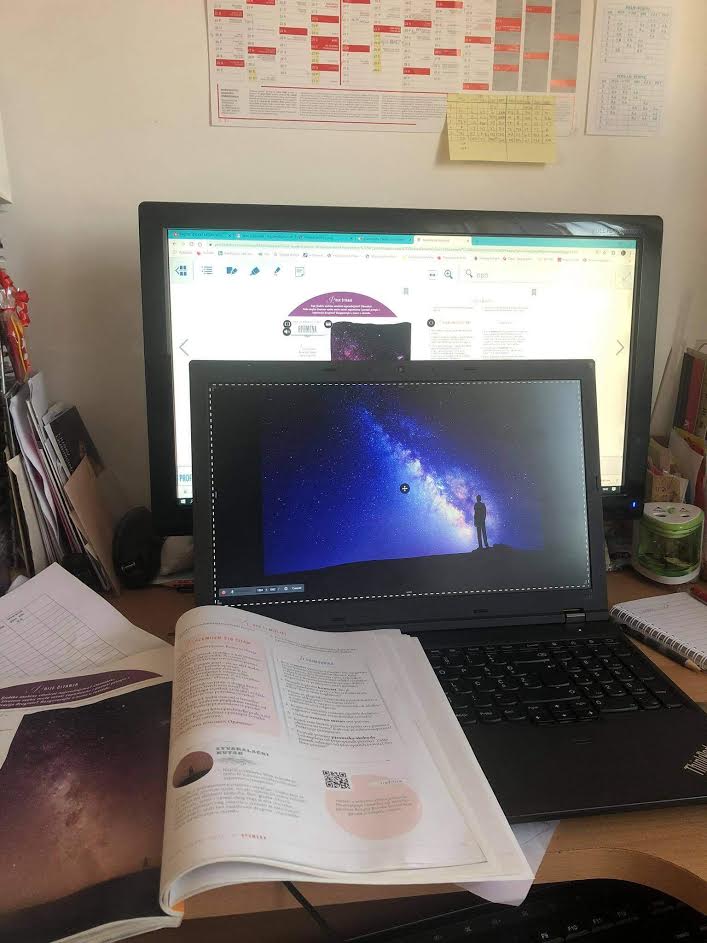
(Photo credit: Maja Priher)
After covering the situation in primary school, let's move to the high school. My source for high school is Cecilija Nekić, a teacher of Italian and Philosophy.
If we leave behind the occasional network problems, according to professor Nekić, the whole system is functionating very well. Professor Nekić says that the transition to online classes was painless. "Everything was done in one day because of the key people from the school who did a great job. Also, I have to mention helpful the parents, who are being understanding and cooperative."
But what she misses the most is the inability to communicate directly with students. "The Socratic method, which consists of well-prepared questions by teachers, leading students to a solution, cannot be implemented," says professor Nekić. Professors tend to send students interactive content, which takes a lot of time. Not only to prepare it but also to find ones that are good enough. Professor Nekić claims that everybody needed some time to get used to the new system, but also, both students and professors understand each other's position.
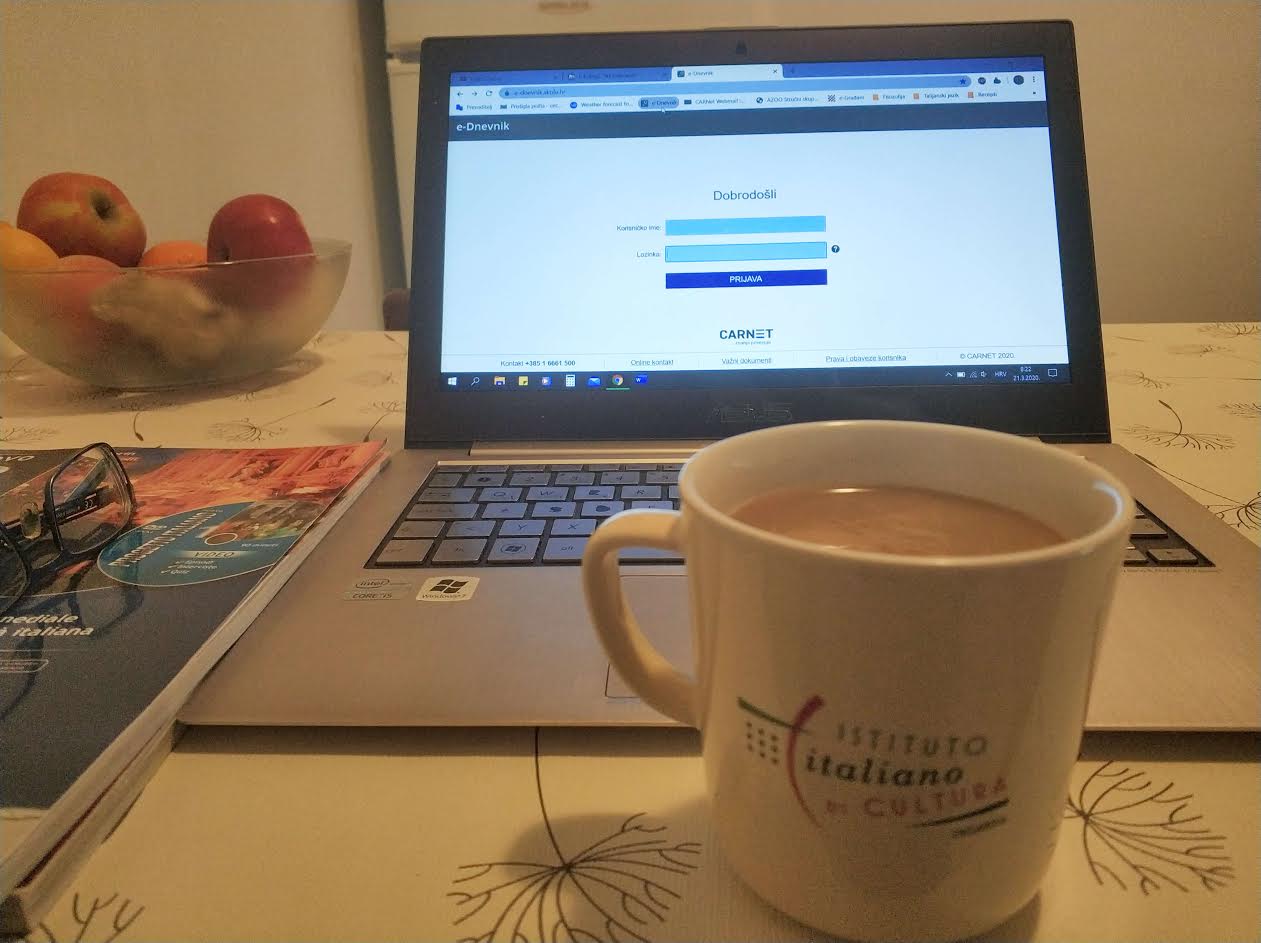
(Photo credit: Cecilija Nekić)
"I often tell my students that the definition of intelligence is the ability to cope with new situations and that this is a real opportunity to practice this premise."
Professor Nekić holds lectures for 250 students, of which six classes are graduate ones, who are now in the biggest panic. Students who are now at the turning point of life told her that they are scared. They are worried that Matura won't be held and that their dream of enrolling in their long-wanted faculty won't happen. They are afraid that they will never return to the classroom with their friends. Professor Nekić tries to calm them down. "I cannot imagine how they feel, but I am always saying to them that we, the teachers, are here for them. I tell them to look at this situation reasonably and rationally, and that it is crucial to maintain a cool head." Also, she advises them to stay away from fake news and to listen to the Ministry.
When asked whether this situation is a good experience or a necessary evil, she answers with something I want to conclude the story from high school. "By no means do I want to underestimate the seriousness of the situation, quite the contrary. I want to emphasize the importance of caring for mental health and drawing attention to the fact that it is our free decision about how we will cope with the same."
After high school, let's see how things look from university. Petra Kovačević is an assistant at the Department of Journalism and Media Production at the Faculty of Political Science at the University of Zagreb and a Ph.D. student at Cardiff University. As one of four lecturers who teaches about Television, she collaborates on courses that are related to the multimedia environment and learning the production of multimedia journalistic forms and exploiting the opportunities of this "virtual" world in the advancement of their journalistic stories.
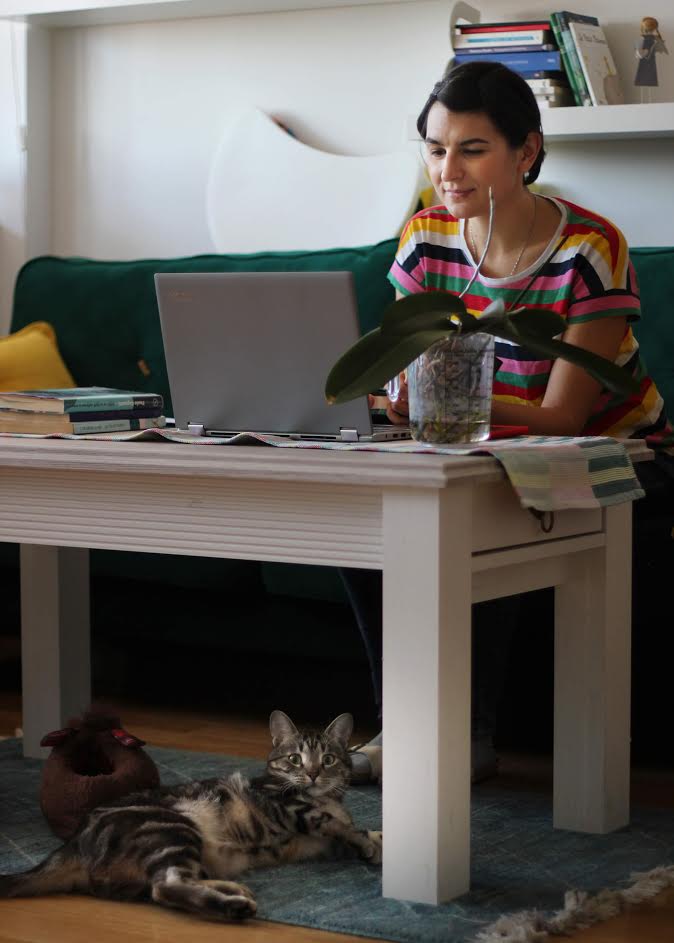
(Photo credit: Petra Kovačević)
She sees this online schooling as a challenge, especially for professors who teach future journalists practical, cognitive, and other skills that are crucial to their profession. "Honestly, this is great for me. I see this as an opportunity for creativity and strengthening one-on-one communication with students."
Besides regular lectures and seminars, she also holds one-on-one Zoom consultations, trying to be the most helpful to her students.
"We came up with a lot of practical tasks for our students so that they can do them with the knowledge they got on regular lectures. This is the way I learned the most while studying Journalism in Cardiff."
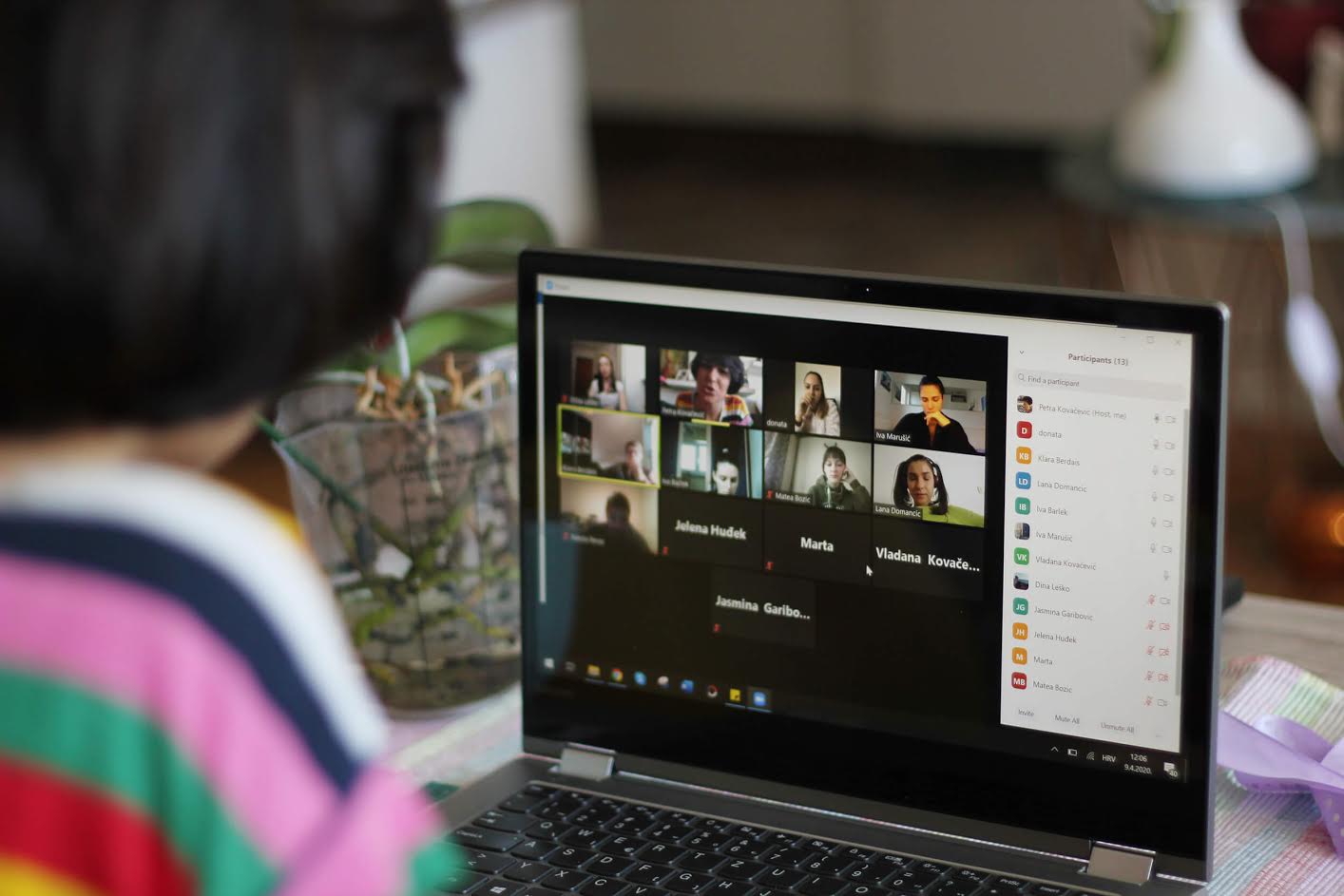
(Photo credit: Petra Kovačević)
Assistant Kovačević believes this is the way students learn the most in a situation like this, but also because students maintain a sense of continuity in fulfilling their obligations. "This means a lot more work for us, professors, but this is fine with me. It is essential that students feel that they are actively traveling towards their destination, that they are concentrated, and less concerned with everything that is happening around us."
She thinks teachers have more responsibility in this process and that they need to think about what is best for their students first. For her, that means transforming the teaching into new circumstances so that students get the same as they did in classical teaching, and maybe even more. "Changes are sometimes good because they stimulate creativity, both for teachers and students. Personally, the well-being of my students is a priority for me. I am fully committed to the task, and it depends on them how much they are prepared to receive."
When it comes to the transition to an online system of schooling, assistant Kovačević agrees with professor Nekić. There was no problem when they already communicate a lot with their students via e-mail or social networks. The only new thing was the Zoom. Assistant Kovačević finds both positive and those less positive sides. "The positive is that we can all see and hear, and the less positive is that you can't 'feel the vibe' in the classroom, the rise or fall of energy, which is very important to me in teaching. Some students never turn on the camera or sound, and sometimes it just means a lot to see and exchange a smile or nod, as we usually can live. I think such small things also mean a lot!"
I asked her for an opinion about those who don't do their obligations. Like students, as do professors. She gave me a humble yet an answer that is worthy of thinking. "Everything a man does; he does to himself."
Assistant Kovačević doesn't think this situation puts knowledge and learning on hold. "Still, it does ask us to be flexible - to ourselves, and especially to students, because they are - for me - first and foremost young people and then my students." Assistant Kovačević sees this as an experience where we all grow together, both professionally and personally.
Lastly, I asked the headmaster of one primary school to share her experience with online schooling. Anđelka Rihatarić explained to me that everything moved online in just one day, as well as that all students and parents were informed about it in a short time. Students from fifth to the eighth year got introduced with MS Team application, the one they use for the virtual classroom, and got their tablets. Thanks to the professor of informatics, Tamara Pofuk, all technical issues were solved.
Lower-grade students watch television classes, which are daily prepared for them by teachers within the School of Life (Škola za život), and their teachers send them additional explanations, materials, assignments, and provide them with feedback on their tasks. This communication goes through the parents - mostly via e-mail or Viber groups. "I have to say that this collaboration is wonderful, quality, cordial both from the teachers and the parents and students. It is a pleasure to watch, and it is, I confess, a spiritual joy how wonderful works, tasks, poems, drawings, recitations are sent by our students."
One of the questions the most people have is how this online schooling will reflect on children who have just started to learn the basics - read, write, build social intelligence, and more. Headmaster Rihtarić gave a positive yet honest opinion saying that at the level of factual knowledge, not all students may adopt all the outcomes they would have acquired if they were in the classroom and constant interaction with their teachers. "But that human contact, the personal warmth of teachers and students, is also realized through this virtual path. In the next school year, we will all make up for any gaps in knowledge, and this experience is of great interest to us, unexpected - and it is an opportunity for us to learn. To all."
Headmaster Rihtarić "definitely and nameless” prefers regular school over the online one. "If school were only about transferring knowledge, we wouldn't even need to be a teacher - Google provides us with all possible information today with just a few clicks ... but what is today the greatest wealth of person-to-person teaching and learning is - humanity, warmth, character."
She continues by saying that this is the reason why schools will never disappear. Today, even under these conditions, distance learning and social self-isolation crystallize that a good teacher is a society's most significant treasure. One teaches with his two authorities: the authority of knowledge and the authority of humanity. "A teacher teaches with his whole person, with his character, with his smile and voice, with his every action," the headmaster said.
That is why the teacher should continue to be exemplary because in his hands, parents put their children every day for 6-8 hours, and society for teachers entrusting the shaping of his future.
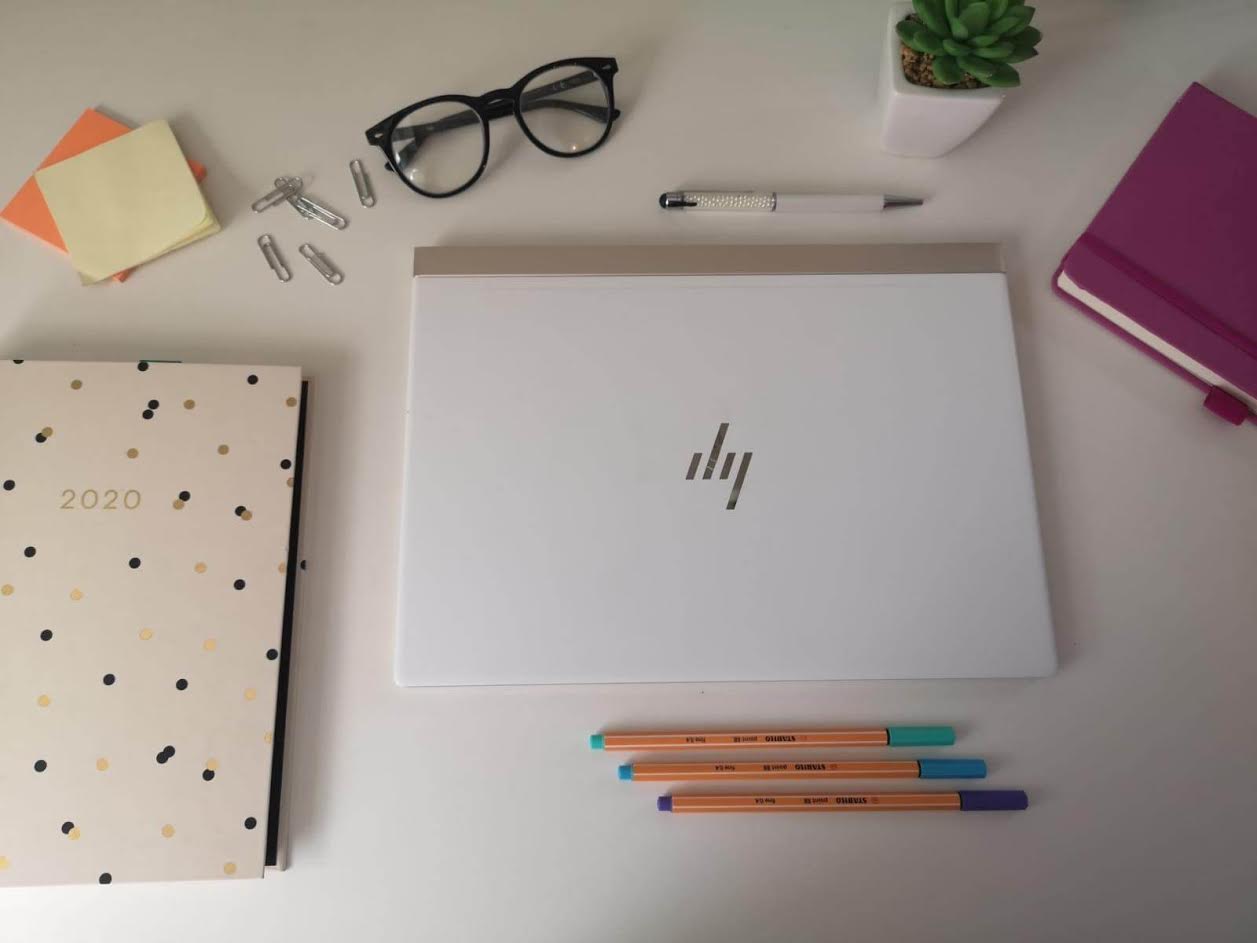
(Photo credit Anđelka Rihatarić)
For headmaster Rihtarić, this situation is a necessary evil, but as in every crisis, this is also a chance for growth. "Teachers are learning a great deal during this period, and students in this environment of distance learning take far greater responsibility for their own learning, for their own success, for planning their day and learning."
When it comes to her job, she works longer hours and in a more demanding environment than usual. In addition to all the regular tasks that she performs, such as daily communication with the competent, official correspondence, planning, and communication with teachers and professional assistants, as well as with parents, she is taking care of the necessary maintenance of the school premises. As a principal, she is obligated to monitor and inspect distance learning. "But that laughter, that youth and courage of our students, that persistence and caring of our parents, that dedication and dedication of most of our teachers - all help me to feel only physical fatigue after 10-12 hours of work. Not spiritual."
If you paid attention, all those people are doing more than is required from them to do; web page, video lectures, friendly advice and support, one-on-one Zoom meetings, and many more. I feel like I shouldn't say anything more but rather let their words and actions speak for themselves. A lot of things stopped, but education is one of the things that can't be put on hold.
For the latest TCN coverage on all aspects of the coronavirus crisis in Croatia, follow out dedicated section.

